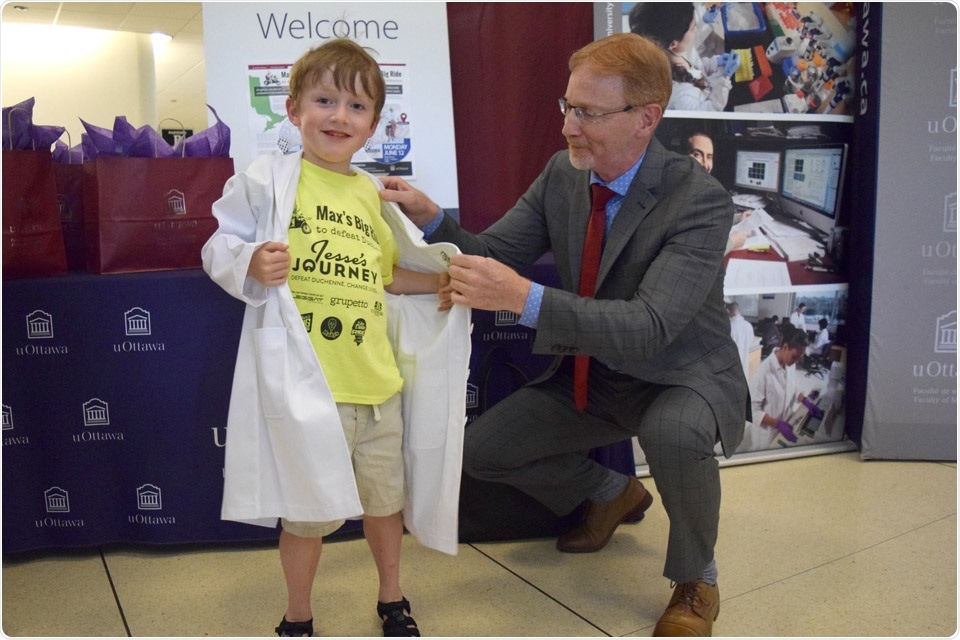If an actor is not in a position to perform in the theatre, an understudy, preferably one with some practice in the role, can take that role on stage.
A research performed in Dr. Bernard Jasmin’s laboratory and reported recently in Nature Communications demonstrates that this holds true for proteins as well.

Dr Jasmin helps Max Sedmihradsky into his lab coat during a stop on Max’s Big Ride. Image Credit: Erin McCracken.
The study outcomes open the door toward innovative therapies for Duchenne muscular dystrophy (DMD).
Children suffering from congenital DMD have a mutation in their X-chromosomal gene. This gene normally codes for dystrophin, which is a protein that offers structural integrity to skeletal muscles.
The deficiency of this protein may cause severe symptoms, which include deterioration of muscle strength starting from the age of four. At present, the average life expectancy of a child with such a condition is 26 years.
Although there is no cure for DMD, a potential area of study has developed around the protein utrophin, which is nearly 80% identical to dystrophin and plays an early role in muscle development. Utrophin is synthesized from a gene on Chromosome 6 and it is found to be intact in a DMD patient.
Utrophin-based therapy is actually applicable to all DMD patients, regardless of their dystrophin mutation. And this is not something we see with most other therapeutic approaches.”
Dr Christine Péladeau, Study Lead Postdoctoral Fellow, University of Ottawa
The focus of this study was on a specific “IRES-dependent translation” pathway, which triggered a cell’s ribosome to activate the production of utrophin. The team of researchers tested 262 FDA-approved drugs to observe the ones that could most effectively trigger IRES-mediated translation to enhance the expression of utrophin in muscle.
Two drugs available in the market at present were considered as the strongest contenders—Pravastatin, a cholesterol-reducing drug, and Betaxolol, a beta-receptor blocker.
When these drugs are administered in a mouse model of DMD, each one caused an increase in muscle strength almost similar to that of the healthy mice.
Several benefits support the targeting of utrophin as a DMD therapy rather than adopting more challenging approaches, which include dystrophin gene replacement with the help of viral vectors.
The repurposing of FDA-approved drugs can also accelerate the clinical trial process. Minimal doses are preferred to improve the chances of low toxicity.
Furthermore, utrophin appears to take part in the body’s own attempts to combat the disease.
There is a tendency for DMD muscles to try to naturally upregulate the levels of utrophin, knowing that it doesn’t have dystrophin. Obviously it’s not enough, but in the absence of this endogenous upregulation, DMD would be a lot worse.”
Dr Bernard Jasmin, University of Ottawa
Dr. Jasmin heads the laboratory at which the study was performed.
When that natural response is further stimulated through the identified pathway, it works along with the body to strengthen muscles without causing an adverse immune response to the therapy.
The study also shows that IRES-mediated translation can be potentially used in the field of therapeutics. It is applicable as a proof of concept to promote the idea that this approach can be used in cancer and neurodegenerative diseases.
Source:
Journal reference:
Péladeau, C., et al. (2020) Identification of therapeutics that target eEF1A2 and upregulate utrophin A translation in dystrophic muscles. Nature communications. doi.org/10.1038/s41467-020-15971-w.